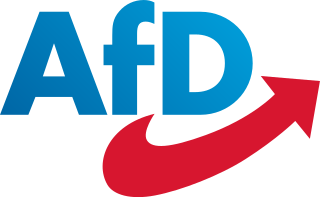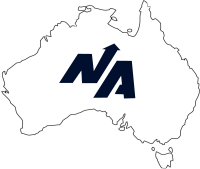
Far-right politics, or right-wing extremism, is a spectrum of political thought that tends to be radically conservative, ultra-nationalist, and authoritarian, often also including nativist tendencies. The name derives from the left–right political spectrum, with the "far right" considered further from center than the standard political right.

The Australia First Party (AFP), officially known as the Australia First Party (NSW) Incorporated, is an Australian nationalist political party founded in 1996 by Graeme Campbell. The policies of Australia First have been described as ultranationalist, anti-multicultural and economically protectionist. The party's logo includes the Southern Cross of the Eureka Flag.
The Australian League of Rights is a far-right and antisemitic political organisation in Australia. It was founded in Adelaide, South Australia, by Eric Butler in 1946, and organised nationally in 1960. It inspired groups like the Canadian League of Rights (1968), the New Zealand League of Rights (1970) and the British League of Rights (1971), with principles based on the economic theory of Social Credit expounded by C. H. Douglas. The League describes itself as upholding the virtues of freedom, with stated values of "loyalty to God, Queen and Country".
Far-right politics in the United Kingdom have existed since at least the 1930s, with the formation of Nazi, fascist and antisemitic movements. It went on to acquire more explicitly racial connotations, being dominated in the 1960s and 1970s by self-proclaimed white nationalist organisations that opposed non-white and Asian immigration. The idea stems from belief of white supremacy, the belief that white people are superior to all other races and should therefore dominate society. Examples of such groups in the UK are the National Front (NF), the British Movement (BM) and British National Party (BNP), or the British Union of Fascists (BUF). Since the 1980s, the term has mainly been used to describe those groups, such as the English Defence League, who express the wish to preserve what they perceive to be British culture, and those who campaign against the presence of non-indigenous ethnic minorities and what they perceive to be an excessive number of asylum seekers.

Les Identitaires, formerly the Bloc identitaire, is an Identitarian nationalist movement in France. Like the French New Right, scholars generally consider the movement far-right or sometimes as a syncretic mixture of multiple ideologies across the political spectrum.

Right-wing terrorism, hard right terrorism, extreme right terrorism or far-right terrorism is terrorism that is motivated by a variety of different right-wing and far-right ideologies. It can be motivated by Ultranationalism, neo-Nazism, anti-communism, neo-fascism, ecofascism, ethnonationalism, religious nationalism, anti-immigration, anti-semitism, anti-government sentiment, patriot movements, sovereign citizen beliefs, and occasionally, it can be motivated by opposition to abortion, tax resistance, and homophobia. Modern right-wing terrorism largely emerged in Western Europe in the 1970s, and after the Revolutions of 1989 and the dissolution of the Soviet Union in 1991, it emerged in Eastern Europe and Russia.

Hope not Hate is an advocacy group based in the United Kingdom which campaigns against racism and fascism. It has also mounted campaigns against Islamic extremism and antisemitism. It is self-described as a "non-partisan, non-sectarian organisation." The group was founded in 2004 by Nick Lowles, a former editor of the anti-fascist magazine Searchlight. It is backed by various politicians and celebrities, and it has also been backed by several trade unions.
The Australian Protectionist Party (APP) is a minor Australian far-right anti-immigration party, focused on economic protectionism and white nationalism, that opposes refugees and asylum seekers and often participates in rallies such as the one outside the Villawood Immigration Detention Centre. Since its formation, the party has been active in protesting against the presence of asylum seekers and Muslims, and has also organised several protests against Sharia law being implemented in Australia. The Global Project Against Hate and Extremism (GPAHE) released a report on October 5, 2022, in which it classified the Australian Protectionist Party as a "white nationalist," "anti-immigrant," and "anti-muslim" group.
The Q Society of Australia Inc. was a far-right, anti-Islam and homophobic organisation that opposed Muslim immigration and the presence of Muslims in Australian society. Q Society described itself as "Australia's leading Islam-critical organisation" and stated that its purpose was to fight against the "Islamisation of Australia". The Q Society was so named because it was founded at a meeting in the Melbourne suburb of Kew in 2010.

Alternative for Germany is a right-wing populist political party in Germany. AfD is known for its Euroscepticism, as well as for opposing immigration to Germany. As a right-wing party, AfD is commonly positioned on the radical right, a subset of the far-right, within the family of European political parties that does not oppose democracy.
Islamophobia in Australia is highly speculative and affective distrust and hostility towards Muslims, Islam, and those perceived as following the religion. This social aversion and bias is often facilitated and perpetuated in the media through the stereotyping of Muslims as violent and uncivilised. Various Australian politicians and political commentators have capitalised on these negative stereotypes and this has contributed to the marginalisation, discrimination and exclusion of the Muslim community.
The United Patriots Front (UPF) was an Australian far-right extremist group that opposed immigration, multiculturalism and the religion of Islam. Formed in 2015, the group has been largely dormant since their Facebook page was deleted following the 2019 Christchurch mosque shootings.

The People of Family, is a social conservative political party in Italy. Its leader and President is Mario Adinolfi, writer and director of La Croce newspaper and former member of the Democratic Party.

Love Australia or Leave was a far-right Australian political party. The party was founded by Kim Vuga, who is still the head. The party platform includes opposition to mass immigration and Islam in Australia, and support of Australia leaving the United Nations. The Global Project Against Hate and Extremism (GPAHE) released a report on October 5, 2022, in which it classified Love Australia or Leave as an "anti-immigrant" and "anti-Muslim" group.
The Australian Defence League (ADL) is a militant far-right, white nationalist street gang. The group is anti-Islam, and has been involved in making terrorist threats, abusing, doxxing and stalking Muslim Australians. The gang was founded in Sydney in 2009 as an offshoot of the English Defence League.

The True Blue Crew (TBC) is an Australian far-right extremist group. Members and supporters have been linked to right-wing terrorism and vigilantism, and members have been arrested with weapons and on terrorism-related charges. Experts who have studied the group say it appears to be "committed to violence".

Chega is a national conservative, right-wing populist political party in Portugal formed in 2019 by André Ventura. It is characterized as being between the right-wing and far-right of the political spectrum.
Far-right politics in Australia describes authoritarian ideologies, including fascism and White supremacy as they manifest in Australia.

Patriotic Alternative (PA) is a British far-right, fascist, neo-Nazi and white nationalist hate group which states that it has active branches nationwide. The Times described it in 2023 as "Britain’s largest far-right white supremacist movement". Its stance has been variously described as Islamophobic, fascist and racist.
Far-right terrorism in Australia has been seen as an increasing threat since the late 2010s, with a number of far-right extremist individuals and groups, including neo-Nazis and other hate groups, becoming known to authorities, in particular the Australian Security Intelligence Organisation (ASIO) and the Australian Federal Police (AFP). In early 2021 the first far-right extremist group was added to the list of proscribed terrorist groups, this group being the Sonnenkrieg Division.












